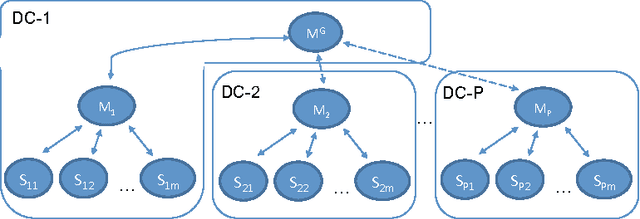Towards Geo-Distributed Machine Learning
Paper and Code
Mar 30, 2016

Latency to end-users and regulatory requirements push large companies to build data centers all around the world. The resulting data is "born" geographically distributed. On the other hand, many machine learning applications require a global view of such data in order to achieve the best results. These types of applications form a new class of learning problems, which we call Geo-Distributed Machine Learning (GDML). Such applications need to cope with: 1) scarce and expensive cross-data center bandwidth, and 2) growing privacy concerns that are pushing for stricter data sovereignty regulations. Current solutions to learning from geo-distributed data sources revolve around the idea of first centralizing the data in one data center, and then training locally. As machine learning algorithms are communication-intensive, the cost of centralizing the data is thought to be offset by the lower cost of intra-data center communication during training. In this work, we show that the current centralized practice can be far from optimal, and propose a system for doing geo-distributed training. Furthermore, we argue that the geo-distributed approach is structurally more amenable to dealing with regulatory constraints, as raw data never leaves the source data center. Our empirical evaluation on three real datasets confirms the general validity of our approach, and shows that GDML is not only possible but also advisable in many scenarios.
 Add to Chrome
Add to Chrome Add to Firefox
Add to Firefox Add to Edge
Add to Edge